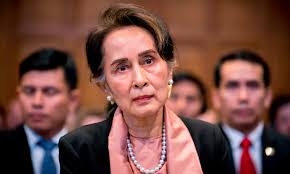
Al Jazeera: After five years as the de facto leader of Myanmar, Aung San Suu Kyi finds herself in a familiar place: under house arrest while facing trumped-up charges levelled by a military dictatorship, with her party, the National League for Democracy (NLD), on the verge of dissolution.
On Monday, four months since the military seized power in a coup, the hugely popular politician will face trial in a Naypyidaw court on five charges including the illegal possession of walkie-talkies and breaking coronavirus restrictions while campaigning for elections. Military officials have also accused her of corruption and violating the colonial-era Official Secrets Act.
There is a sense of finality about this showdown between Aung San Suu Kyi, and army chief and coup leader, Min Aung Hlaing.
At 75-years-old, Aung San Suu Kyi is facing prison sentences that could put her in jail for the rest of her life, permanently sidelining her from a political arena she has defined for decades.
Tarnished icon
Aung San Suu Kyi emerged as a political force during the 1988 uprisings against a previous military regime, perfectly primed to take the helm of Myanmar’s pro-democracy movement during a period of instability. The daughter of independence icon Aung San, she had just returned from the United Kingdom, where she studied at Oxford and had married a British man.
But while she was a global superstar as an activist, many of her biggest supporters were disappointed once she was in power.
In 2017, hundreds of thousands of mostly Muslim Rohingya fled into Bangladesh as the military unleashed a brutal crackdown in the western state of Rakhine.
The Nobel Prize winner did not condemn the military’s actions and, after a case of genocide was brought before the International Court of Justice in The Hague, she travelled to the Netherlands to defend what the generals had done.
“Aung San Suu Kyi’s domestic popularity only grew as she transitioned from dissident to national leader. Internationally, she fell spectacularly from grace as a result of the violence against the Rohingya, in which she was seen as complicit by denying the extent of abuses and defending the military,” said Horsey.
Activist and protest leader Thinzar Shunlei Yi is one of many young human rights defenders who grew up idolising Aung San Suu Kyi, only to be let down by her time in power.
“She was the reason why I became a woman human rights defender,” she said. But as violence against the Rohingya grew, Thinzar Shunlei Yi became one of the only people to speak out against it, putting her at odds with her hero and her throngs of supporters.
“I was outspoken against her and got a lot of backfire,” she said.
Calls for radical change
It was not just during the Rohingya crisis where Aung San Suu Kyi failed to live up to expectations.
When two Reuters journalists were arrested for exposing the military killings of Rohingya civilians, Aung San Suu Kyi said the case “had nothing to do with freedom of expression at all”. During her time in power, journalists and Facebook users faced criminal charges for criticising NLD politicians.
With NLD leadership scattered or in prison after the coup, more progressive activists like Thinzar Shunlei Yi found themselves spearheading the initial resistance movement. They called for increasingly radical change, like abolishing the military-drafted 2008 constitution, the complete removal of the military from politics, the reform of the discriminatory 1982 Citizenship Law which helped render the Rohingya stateless, and armed revolution rather than non-violent resistance.

